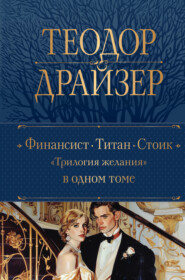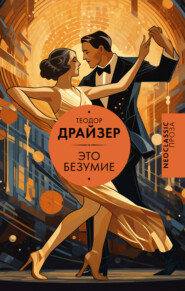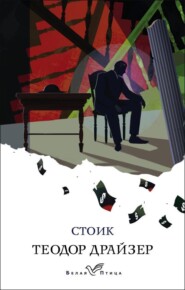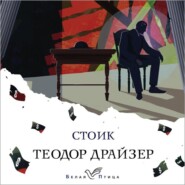По всем вопросам обращайтесь на: info@litportal.ru
(©) 2003-2024.
✖
Sister Carrie / Сестра Кэрри. Книга для чтения на английском языке
Настройки чтения
Размер шрифта
Высота строк
Поля
“Oh, over two thousand dollars. He says it’s a dandy[39 - He says it's a dandy. – Он говорил, что она превосходна.].”
“Old Fahrway must be making money,” put in Hurstwood.
“He is, I guess. Jack told me they were shipping Vegacura to Australia now – said they sent a whole box to Cape Town last week.”
“Just think of that!” said Mrs. Hurstwood, “and only four years ago they had that basement in Madison Street.”
“Jack told me they were going to put up a six-story building next spring in Robey Street.”
“Just think of that!” said Jessica.
On this particular occasion Hurstwood wished to leave early.
“I guess I’ll be going down town,” he remarked, rising.
“Are we going to McVicker’s Monday?” questioned Mrs.
Hurstwood, without rising.
“Yes,” he said indifferently.
They went on dining, while he went upstairs for his hat and coat. Presently the door clicked.
“I guess papa’s gone,” said Jessica.
The latter’s school news was of a particular stripe.
“They’re going to give a performance in the Lyceum, upstairs,” she reported one day, “and I’m going to be in it.”
“Are you?” said her mother.
“Yes, and I’ll have to have a new dress. Some of the nicest girls in the school are going to be in it. Miss Palmer is going to take the part of Portia.”
“Is she?” said Mrs. Hurstwood.
“They’ve got that Martha Griswold in it again. She thinks she can act.”
“Her family doesn’t amount to anything, does it?” said Mrs. Hurstwood sympathetically. “They haven’t anything, have they?”
“No,” returned Jessica, “they’re poor as church mice.”
She distinguished very carefully between the young boys of the school, many of whom were attracted by her beauty.
“What do you think?” she remarked to her mother one evening;
“that Herbert Crane tried to make friends with me.”
“Who is he, my dear?” inquired Mrs. Hurstwood.
“Oh, no one,” said Jessica, pursing her pretty lips. “He’s just a student there. He hasn’t anything.”
The other half of this picture came when young Blyford, son of Blyford, the soap manufacturer, walked home with her. Mrs. Hurstwood was on the third floor, sitting in a rocking-chair reading, and happened to look out at the time.
“Who was that with you, Jessica?” she inquired, as Jessica came upstairs.
“It’s Mr. Blyford, mamma,” she replied.
“Is it?” said Mrs. Hurstwood.
“Yes, and he wants me to stroll over into the park with him,” explained Jessica, a little flushed with running up the stairs.
“All right, my dear,” said Mrs. Hurstwood. “Don’t be gone long.”
As the two went down the street, she glanced interestedly out of the window. It was a most satisfactory spectacle indeed, most satisfactory.
In this atmosphere Hurstwood had moved for a number of years, not thinking deeply concerning it.
During the last year or two the expenses of the family seemed a large thing. Jessica wanted fine clothes, and Mrs. Hurstwood, not to be outshone by her daughter, also frequently enlivened her apparel. Hurstwood had said nothing in the past, but one day he murmured.
“Jessica must have a new dress this month,” said Mrs. Hurstwood one morning.
Hurstwood was arraying himself in one of his perfection vests before the glass at the time.
“I thought she just bought one,” he said.
“That was just something for evening wear,” returned his wife complacently.
“It seems to me,” returned Hurstwood, “that she’s spending a good deal for dresses of late.”
“Well, she’s going out more,” concluded his wife, but the tone of his voice impressed her as containing something she had not heard there before.
He was not a man who traveled much, but when he did, he had been accustomed to take her along. On one occasion recently a local aldermanic junket[40 - a local aldermanic junket – развлекательная поездка членов местного муниципалитета] had been arranged to visit Philadelphia – a junket that was to last ten days. Hurstwood had been invited.
“Nobody knows us down there,” said one, a gentleman whose face was a slight improvement over gross ignorance and sensuality. He always wore a silk hat of most imposing proportions. “We can have a good time.” His left eye moved with just the semblance of a wink. “You want to come along, George.”
The next day Hurstwood announced his intention to his wife.
“I’m going away, Julia,” he said, “for a few days.”
“Where?” she asked, looking up.
“To Philadelphia, on business.”
She looked at him consciously, expecting something else.
“I’ll have to leave you behind this time.”
“All right,” she replied, but he could see that she was thinking that it was a curious thing. Before he went she asked him a few more questions, and that irritated him. He began to feel that she was a disagreeable attachment.
“Old Fahrway must be making money,” put in Hurstwood.
“He is, I guess. Jack told me they were shipping Vegacura to Australia now – said they sent a whole box to Cape Town last week.”
“Just think of that!” said Mrs. Hurstwood, “and only four years ago they had that basement in Madison Street.”
“Jack told me they were going to put up a six-story building next spring in Robey Street.”
“Just think of that!” said Jessica.
On this particular occasion Hurstwood wished to leave early.
“I guess I’ll be going down town,” he remarked, rising.
“Are we going to McVicker’s Monday?” questioned Mrs.
Hurstwood, without rising.
“Yes,” he said indifferently.
They went on dining, while he went upstairs for his hat and coat. Presently the door clicked.
“I guess papa’s gone,” said Jessica.
The latter’s school news was of a particular stripe.
“They’re going to give a performance in the Lyceum, upstairs,” she reported one day, “and I’m going to be in it.”
“Are you?” said her mother.
“Yes, and I’ll have to have a new dress. Some of the nicest girls in the school are going to be in it. Miss Palmer is going to take the part of Portia.”
“Is she?” said Mrs. Hurstwood.
“They’ve got that Martha Griswold in it again. She thinks she can act.”
“Her family doesn’t amount to anything, does it?” said Mrs. Hurstwood sympathetically. “They haven’t anything, have they?”
“No,” returned Jessica, “they’re poor as church mice.”
She distinguished very carefully between the young boys of the school, many of whom were attracted by her beauty.
“What do you think?” she remarked to her mother one evening;
“that Herbert Crane tried to make friends with me.”
“Who is he, my dear?” inquired Mrs. Hurstwood.
“Oh, no one,” said Jessica, pursing her pretty lips. “He’s just a student there. He hasn’t anything.”
The other half of this picture came when young Blyford, son of Blyford, the soap manufacturer, walked home with her. Mrs. Hurstwood was on the third floor, sitting in a rocking-chair reading, and happened to look out at the time.
“Who was that with you, Jessica?” she inquired, as Jessica came upstairs.
“It’s Mr. Blyford, mamma,” she replied.
“Is it?” said Mrs. Hurstwood.
“Yes, and he wants me to stroll over into the park with him,” explained Jessica, a little flushed with running up the stairs.
“All right, my dear,” said Mrs. Hurstwood. “Don’t be gone long.”
As the two went down the street, she glanced interestedly out of the window. It was a most satisfactory spectacle indeed, most satisfactory.
In this atmosphere Hurstwood had moved for a number of years, not thinking deeply concerning it.
During the last year or two the expenses of the family seemed a large thing. Jessica wanted fine clothes, and Mrs. Hurstwood, not to be outshone by her daughter, also frequently enlivened her apparel. Hurstwood had said nothing in the past, but one day he murmured.
“Jessica must have a new dress this month,” said Mrs. Hurstwood one morning.
Hurstwood was arraying himself in one of his perfection vests before the glass at the time.
“I thought she just bought one,” he said.
“That was just something for evening wear,” returned his wife complacently.
“It seems to me,” returned Hurstwood, “that she’s spending a good deal for dresses of late.”
“Well, she’s going out more,” concluded his wife, but the tone of his voice impressed her as containing something she had not heard there before.
He was not a man who traveled much, but when he did, he had been accustomed to take her along. On one occasion recently a local aldermanic junket[40 - a local aldermanic junket – развлекательная поездка членов местного муниципалитета] had been arranged to visit Philadelphia – a junket that was to last ten days. Hurstwood had been invited.
“Nobody knows us down there,” said one, a gentleman whose face was a slight improvement over gross ignorance and sensuality. He always wore a silk hat of most imposing proportions. “We can have a good time.” His left eye moved with just the semblance of a wink. “You want to come along, George.”
The next day Hurstwood announced his intention to his wife.
“I’m going away, Julia,” he said, “for a few days.”
“Where?” she asked, looking up.
“To Philadelphia, on business.”
She looked at him consciously, expecting something else.
“I’ll have to leave you behind this time.”
“All right,” she replied, but he could see that she was thinking that it was a curious thing. Before he went she asked him a few more questions, and that irritated him. He began to feel that she was a disagreeable attachment.

















